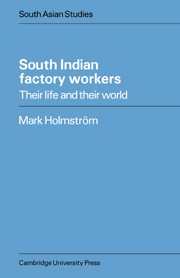3 - Life as a factory worker
Published online by Cambridge University Press: 06 October 2009
Summary
These factory workers have much in common. They belong to a distinctive Indian industrial culture, with typical assumptions and expectations and tastes which cut across divisions of skill and age and origin. They share a common situation. They act, and sometimes think of themselves, as a group (if not a class) different from peasants, workers in the ‘unorganized sector’ or in older factories with different technologies, from casual labourers, shopkeepers, professional people and so on. I would need the skill of a novelist like R. K. Narayan to give the real flavour of their life and company.
This chapter brings together individual workers' accounts of their careers, and what else I know about their situation and chances, to build up a composite picture of what it is to be an organized sector worker now, matching ‘facts’ and workers' arguments in particular contexts of experience – like job finding, home life and so on.
What is happening to these people? How do they and others see their situation, and make sense of it in terms of the value-loaded categories they already have (the self in relation to others, castes, classes, marriage, career etc.)? How do they act to achieve existing objectives (the ‘logic of the situation’)? How do they revise social categories and values, and set themselves new objectives, taking into account a new situation and the choices it presents them with?
This approach to the dialectic of situation, thought and action implies that the agent chooses freely, that he constructs his own world, within the constraints of real possibilities, available knowledge and so on.
- Type
- Chapter
- Information
- South Indian Factory WorkersTheir Life and their World, pp. 27 - 85Publisher: Cambridge University PressPrint publication year: 1976



